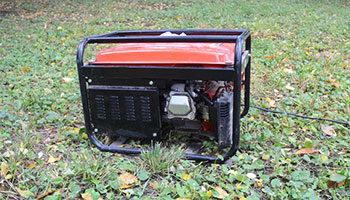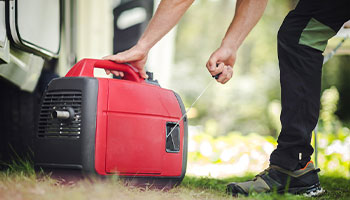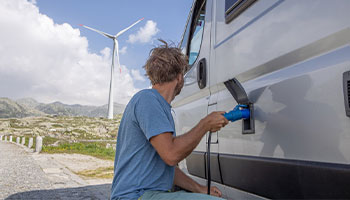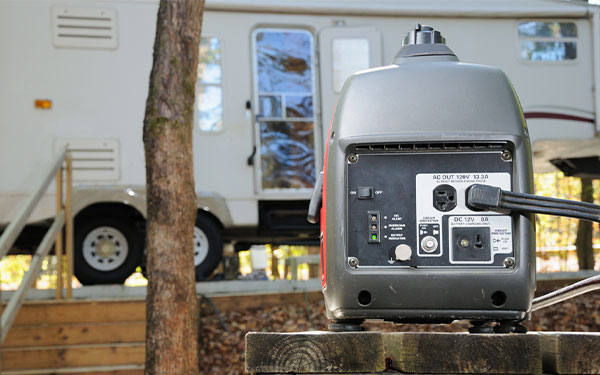The beauty of RVing is that there is no right way of exploring. Whether you prefer to stay at popular amenity-filled parks or seek the quietness of boondocking, your options are endless. But depending on your travel style, you may only sometimes have access to electrical hookups. This is where RV generators come in handy.
Like RVs themselves, RV generators come in many different shapes and sizes. To help you better understand the kind of RV generator that suits your needs, we’ll be covering some basics that are important to know.
Do All RVs Have Built-In Generators?
Depending on your rig, you may already have a generator on hand. RV generators that come installed in an RV are referred to as onboard generators. These typically have their own storage compartment and can run on either diesel, gasoline, or propane.
Onboard generators are common on new, higher-end Class A rigs. Unfortunately, most travel trailers and smaller campers are not equipped with an onboard generator. For these RVs, you’ll need a portable option to power your appliances if you don’t have access to electrical hookups or solar power.
RV Generators 101: The Two Types of Portable Generators
When shopping for a portable RV generator, you’ll come across two types: conventional and inverter.
Regardless of which type you decide on, it’s important to remember that you should never operate a portable generator indoors as they can produce fatal carbon monoxide gas.

Conventional Generators
Conventional generators are the types of generators often seen on worksites. For this reason, they’re also known as contractor generators.
Conventional generators are the most cost-effective option compared to others. They have typical power ranges between 3,000 and 10,000 watts of accessible energy. However, because the engine is often exposed, this type of generator is typically disliked by RVers at campsites due to their noise. In addition, they are also less fuel-efficient unless you run high loads consistently.
Inverter Generators

An inverter generator is a portable generator that converts DC power into AC power. Put simply, this means that the inverter can produce clean, stable energy more efficiently than a conventional generator. These generators are often marketed as RV-specific.
Unlike their counterparts, inverter generators are fully enclosed, which allows them to run much quieter. A bonus of inverter generators is that some models can also run in parallel, meaning you can produce additional power using two smaller units. These generators typically have power ranges between 1,000 and 5,000 watts.
When shopping for an RV generator, most RVers opt for inverter generators due to their added benefits.
What Size Generator Do I Need?
Because of their varying power outputs and sizes, you’ll need a generator suitable for your RV travel style.
To calculate how much power you need, add up all the wattage of the appliances you want to run simultaneously, such as your refrigerator or microwave. After adding these values, you’ll have a rough idea of how much power you’ll need to power them altogether. Use this figure when shopping for an RV generator.
Pro tip: some appliances, such as your AC, use a surge of power when starting up. To avoid issues, add an extra amount of watts to your wattage list to account for any startup power required.
RV Generators 101: The Different Fuel Types Available
RV generators typically rely on one of the following fuel sources: gasoline, diesel, or propane. Your RV travel style and power requirements will ultimately influence the type of generator you purchase. However, keep in mind that your RV’s fuel type can also play a role, specifically for diesel-powered RVs.
Here are some pros and cons of each fuel type.
Gasoline Generators
Pros: Because gasoline is readily available, gasoline-powered generators are easy to keep running. These generators often produce greater power than their propane counterparts. They are also typically the least expensive.
Cons: Although gas is accessible, it does have a strong odor. Gasoline is also a dirtier fuel source than propane or diesel. These are often the least fuel-efficient generators.
Diesel Generators
Pros: When comparing generators by power alone, diesel generators are typically the most powerful. They also tend to have the longest operating lifespan than other models on the market.
Cons: Diesel can be more expensive than propane or gasoline. As a result, these generators are more costly than their propane and gasoline-powered counterparts.
Propane Generators
Pros: Propane generators are highly fuel-efficient and are very quiet.
Cons: These generators typically are the least powerful. Additionally, finding a propane tank large enough to power your rig for an extended amount of time may be challenging.
Safety First
Although issues are uncommon, it is important to understand the potential hazards when operating a generator.

The biggest threat involved is the release of carbon monoxide gas, which can be fatal. Therefore, you should never operate a generator indoors. For added precaution, consider purchasing a carbon monoxide detector for your RV, as it’s possible for wind conditions to push outside fumes into your rig. Additionally, because fuel sources are highly flammable, keep them properly stored away from a running generator.
You should only use portable generators in fair weather conditions to avoid any potential circuits from falling rain or water. Also, if the landscape is dry, keep your generator away from dry grass or leaves to prevent a fire.
Keeping Your RV Protected
No matter where your adventures take you, it’s essential to have a specialized RV insurance policy. Unlike standard auto policies, specialized RV policies can include RV-specific coverage types that will keep your assets protected in the event of an accident. This is especially important if you’ll be venturing to new areas or dry camping.
To learn more about the various options available, give our RV insurance specialists a call today at (866) 501-7335.
The information in this article is obtained from various sources and is offered for educational purposes. Furthermore, it should not replace manuals or instructions provided by the manufacturer or the advice of a qualified professional. No warranty or appropriateness for a specific purpose is expressed or implied.
